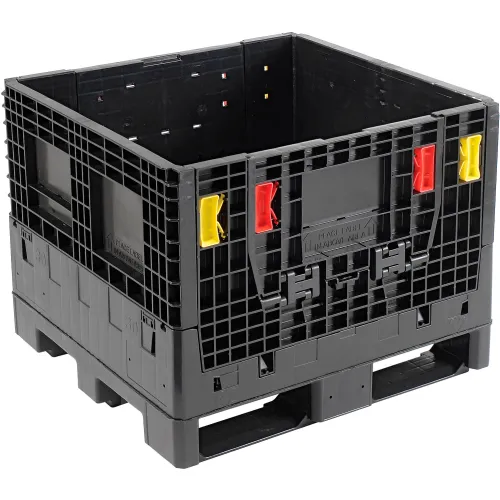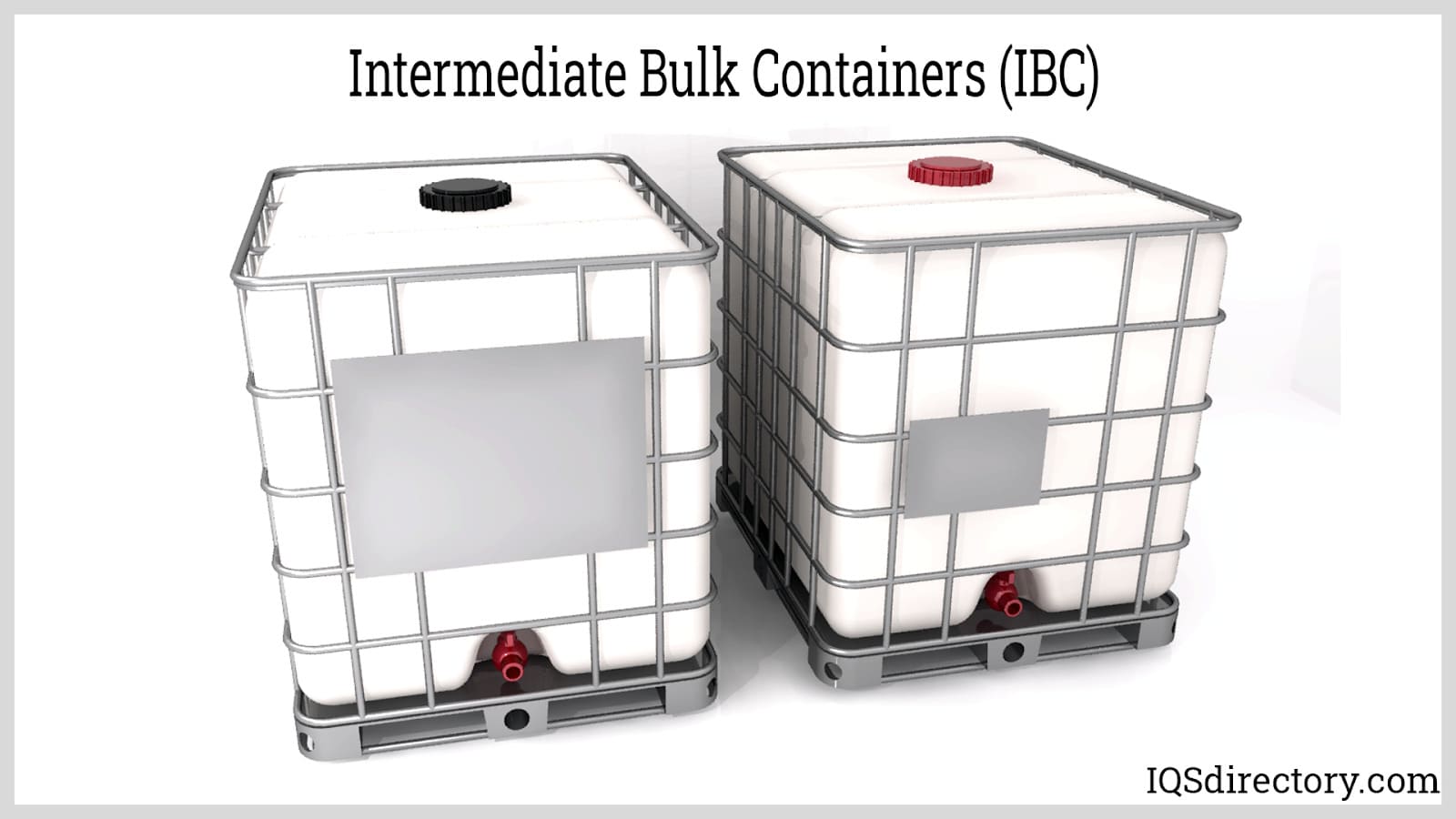How bulk plastic containers for sale can enhance your business operations
The Role of Bulk Plastic Containers in Effective Recycling Practices and Sustainability
Bulk plastic containers are essential to modern-day recycling initiatives. Their style enhances the effectiveness of material collection and transportation, adding to sustainability objectives. These containers not just maximize room yet also help in checking contamination degrees. Nonetheless, their execution is not without obstacles. Comprehending the full extent of their impact reveals a complicated relationship in between logistics and environmental duty that warrants more exploration.
Understanding Mass Plastic Containers
Bulk plastic containers serve as a crucial component in numerous industries, helping with the storage space and transport of items. These containers are normally made from durable materials such as high-density polyethylene (HDPE) or polypropylene, which supply durability and resistance to ecological variables. Their design commonly includes attributes like stackability and modularity, allowing for effective use of room during both storage and transit.
Industries such as agriculture, food handling, and manufacturing often use mass plastic containers as a result of their light-weight nature and simplicity of handling. The containers can be found in numerous dimensions and configurations, providing to the details requirements of various items. Their versatility extends past simple capability; they can likewise be tailored with covers, handles, and classifying options to enhance functionality - plastic bulk containers. Consequently, bulk plastic containers play an essential function in optimizing logistics and supply chain operations across numerous fields, thereby adding to overall effectiveness and cost-effectiveness
Advantages of Using Mass Plastic Containers in Recycling
When organizations focus on reusing initiatives, the use of mass plastic containers substantially improves the effectiveness of the procedure. These containers are designed to enhance space, enabling the storage and transport of bigger amounts of recyclable products. This results in fewer journeys to reusing facilities, therefore minimizing gas consumption and connected emissions.
Furthermore, mass plastic containers are sturdy and immune to various environmental aspects, ensuring that materials stay secured throughout handling and transportation. Their lightweight design even more adds to decrease transportation expenses.
Furthermore, the uniformity of these containers facilitates better sorting and handling of recyclable products, which can improve general recycling rates - Bulk Plastic Containers. Organizations that adopt bulk plastic containers also show a commitment to sustainability, positively affecting their brand picture. Inevitably, these benefits not only enhance reusing methods however likewise contribute to broader ecological goals
Just How Mass Plastic Containers Facilitate Material Collection
Efficient product collection is substantially improved by the use of bulk plastic containers, as they provide a structured and reliable service for gathering recyclable things. These containers are developed to fit huge quantities of materials, which streamlines the sorting and storage space process. Their stackable design maximizes area use, making it less complicated for centers to arrange recyclables without clutter.
In addition, bulk plastic containers are weather-resistant and durable, enabling outdoor placement without deterioration. This durability ensures that products remain safeguarded up until they are gathered for handling.

The uniformity in dimension and shape of these containers facilitates standardization across collection factors, enabling better tracking of recyclable volumes. In addition, their transparent nature permits easy visibility of materials, helping in the monitoring of contamination degrees and assuring that just suitable products are collected. In general, bulk plastic containers play a crucial duty in streamlining the product collection procedure, thereby advertising reliable reusing methods.
Transport Efficiency and Environmental Influence
Transport efficiency plays a necessary duty in the reusing procedure, particularly with the optimization of lots capability wholesale plastic containers. By optimizing the quantity of product transferred, firms can considerably reduce the number of trips called for, therefore minimizing their carbon footprint. This approach not only improves functional efficiency but likewise adds to extra lasting environmental practices.

Maximizing Load Capacity
Maximizing load capacity is often neglected, it plays a necessary function in improving transport efficiency and decreasing ecological influence in reusing techniques. By taking full advantage of the quantity that mass plastic containers can hold, recycling procedures can decrease the number of trips needed for transportation. This not only reduces gas consumption but likewise reduces the deterioration on vehicles. Effective lots monitoring enables centers to utilize area properly, making certain that each transportation cycle is as productive as possible. Additionally, well-optimized loads can lead to much better negotiations with logistics companies, possibly decreasing total costs. Inevitably, improving lots ability adds to a more sustainable recycling system by cultivating efficient source usage and lessening waste produced throughout transport.
Reducing Carbon Footprint
As reusing procedures undertaking to minimize their environmental effect, lowering the carbon impact related to transportation becomes a crucial objective. Mass plastic containers play a crucial function in attaining this aim by improving tons effectiveness and enhancing logistics. Their light-weight yet resilient layout permits optimum freight area application, minimizing the number of trips called for to transfer products. By consolidating deliveries, recycling facilities can lower gas intake and greenhouse gas discharges. Furthermore, purposefully finding recycling facilities lessens transport distances, in addition decreasing carbon outputs. Using fuel-efficient vehicles and alternate power sources boosts general sustainability. By integrating these techniques, the recycling market can significantly decrease its carbon impact, adding to an extra sustainable future.
Difficulties in making use of Bulk Plastic Containers

Contamination Concerns
Contamination concerns stand for a substantial obstacle in the reliable usage of bulk plastic containers within recycling methods. These containers usually build up deposits from previous materials, bring about blended materials that can prevent the recycling procedure. Pollutants such as food waste, chemicals, or non-recyclable materials can endanger the honesty of the entire set, causing raised disposal expenses and reduced reusing prices. Additionally, inappropriate cleaning or sorting can aggravate these issues, making it difficult for recycling facilities to process products effectively. The existence of impurities not just affects the top quality of recycled products yet likewise weakens the total sustainability efforts focused on minimizing plastic waste. Resolving these contamination challenges is critical for boosting the effectiveness of bulk plastic container recycling.
Recycling Facilities Limitations
Inefficiency in reusing framework presents considerable difficulties for the efficient management of bulk plastic containers. Several reusing facilities do not have the ability to process huge quantities of these containers efficiently, resulting in raised expenses and delays. In addition, poor arranging modern technologies typically result in contamination, as mass containers might be mixed with various other materials, complicating the reusing procedure. Minimal transportation options likewise prevent the motion of mass plastic containers to ideal recycling centers, resulting in boosted land fill waste. In addition, a lack of standard procedures for bulk container recycling develops confusion among consumers and services, even more making complex initiatives to advertise sustainability. Dealing with these framework constraints is important to boost reusing practices and take full advantage of the possibility of bulk plastic containers in a circular economic situation.
Finest Practices for Carrying Out Mass Plastic Containers
They should focus on a critical strategy that enhances efficiency and decreases contamination risks when companies think about executing bulk plastic containers in their recycling techniques. First, choosing the suitable container dimension and kind is necessary to suit the quantity of products being refined. Organizations needs to additionally establish clear labeling and signs to guide individuals on correct disposal approaches, minimizing complication and errors. Normal training sessions for team can additionally reinforce these techniques, making sure every person understands their duties in keeping recycling honesty.
Additionally, companies need to apply a regular maintenance schedule to inspect and clean containers, stopping the accumulation of pollutants. Partnering with local reusing centers can likewise enhance the collection procedure, ensuring that products are efficiently processed. Lastly, organizations must check and evaluate their reusing metrics, utilizing this data to improve practices in time and promote continuous improvement in their sustainability initiatives.
The Future of Mass Plastic Containers in Sustainable Practices
As organizations increasingly focus on sustainability, the duty of bulk plastic containers in reusing techniques is readied to develop substantially. Technologies in products science are bring about the growth of recyclable and biodegradable options, enhancing the ecological benefits of mass plastic containers. Additionally, the application of closed-loop systems will permit for much easier collection and repurposing of these containers, decreasing waste and source intake.
Technical improvements, such as clever monitoring systems, will certainly enable companies to monitor the lifecycle of mass containers, enhancing effectiveness in recycling processes. As customer demand for lasting methods expands, businesses will likely embrace mass plastic containers developed for reuse and long-lasting worth. In addition, cooperation in between markets and governments will certainly cultivate the establishment of standardized reusing protocols, guaranteeing that mass containers are effectively incorporated right into wider sustainability initiatives. Overall, the future of bulk plastic containers appears appealing, with considerable possibility for adding to a round view it now economic climate.
Regularly Asked Concerns
Exactly How Are Mass Plastic Containers Made and What Materials Are Utilized?
Mass plastic containers are usually made from high-density polyethylene (HDPE) or polypropylene (PP) These materials are refined via injection molding or blow molding strategies, resulting in durable, light-weight containers appropriate for different storage space and transport needs.
Can Bulk Plastic Containers Be Reused Numerous Times Before Recycling?
Yes, bulk plastic containers can be reused several times prior to reusing. Their sturdiness and style enable duplicated use in different applications, promoting sustainability and resource performance while decreasing the demand for brand-new containers.

What Qualifications Exist for Mass Plastic Containers in Recycling?
Numerous accreditations for bulk plastic containers consist of the Recycling Partnership's accreditation, the Cradle to Cradle Certified ™ criterion, and the Sustainable Packaging Coalition's standards, making sure containers satisfy certain ecological and recyclability standards for efficient recycling.
How Do Mass Plastic Containers Compare to Various Other Recycling Storage Options?
Mass plastic containers offer higher durability and capability compared to other recycling browse around here storage space alternatives, lowering the risk of contamination and assisting in effective transportation. Their design sustains far better company, boosting general performance in reusing procedures.
What Is the Life expectancy of a Bulk Plastic Container in Recycling Processes?
The life expectancy of a bulk plastic container in reusing procedures generally ranges from 5 to ten years, depending upon usage, worldly top quality, and ecological problems, permitting several cycles of usage before eventual disposal or recycling.
When companies focus on reusing initiatives, the application of bulk plastic containers significantly enhances the efficiency of the process. Transport efficiency plays a necessary role in the recycling procedure, especially via the optimization of load capacity in mass plastic containers. The use of mass plastic containers in recycling techniques encounters significant challenges, specifically worrying contamination concerns and restrictions within recycling infrastructure. Contamination issues stand for a significant challenge in the reliable use of bulk plastic containers within reusing practices. When organizations consider executing mass plastic containers in their recycling techniques, they must focus on a tactical approach that improves performance and decreases contamination threats.